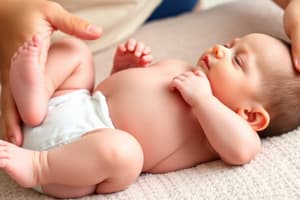Podcast
Questions and Answers
What is neonatal mobility?
What is neonatal mobility?
- The cognitive development of newborns, typically from birth to 12 months
- The language skills of infants, typically from 0 to 12 months
- The movement and motor skills of infants from 0 to 12 months
- The movement and motor skills of newborns, typically from birth to 28 days (correct)
What type of neonatal movement is characterized by automatic responses to stimuli?
What type of neonatal movement is characterized by automatic responses to stimuli?
- Voluntary movements
- Neurological movements
- Intentional movements
- Reflexive movements (correct)
What is the primary characteristic of voluntary movements in neonates?
What is the primary characteristic of voluntary movements in neonates?
- Random movements without a clear purpose
- Movements initiated by external stimuli
- Intentional movements, such as arm and leg movements (correct)
- Automatic responses to stimuli
At what age do neonates typically exhibit an increase in voluntary movements?
At what age do neonates typically exhibit an increase in voluntary movements?
What factor can influence neonatal mobility through inherited traits and predispositions?
What factor can influence neonatal mobility through inherited traits and predispositions?
What is the clinical significance of assessing neonatal mobility?
What is the clinical significance of assessing neonatal mobility?
What type of interventions can enhance motor skill development in neonates?
What type of interventions can enhance motor skill development in neonates?
What can be identified through the assessment of neonatal mobility?
What can be identified through the assessment of neonatal mobility?
Flashcards are hidden until you start studying
Study Notes
Definition and Importance
- Neonatal mobility refers to the movement and motor skills of newborns, typically from birth to 28 days.
- It is essential for brain development, motor skill acquisition, and overall health.
Types of Neonatal Movements
- Reflexive movements: automatic responses to stimuli, such as:
- Rooting reflex (sucking)
- Sucking reflex
- Tonic neck reflex (head turning)
- Moro reflex (startle response)
- Voluntary movements: intentional movements, such as:
- Arm and leg movements
- Hand-to-mouth movements
- Eye movements
Developmental Milestones
- 0-3 days: mostly reflexive movements, with some voluntary movements
- 4-7 days: increase in voluntary movements, such as arm and leg movements
- 8-14 days: improvement in hand-to-mouth movements and eye movements
- 15-28 days: refinement of motor skills, such as reaching and grasping
Factors Influencing Neonatal Mobility
- Genetics: inherited traits and predispositions
- Maternal factors: maternal health, nutrition, and stress during pregnancy
- Environmental factors: uterine environment, birth experience, and postnatal care
- Neurological development: brain maturation and organization
Clinical Significance
- Assessment: evaluation of neonatal mobility can indicate neurological function and developmental potential
- Interventions: targeted exercises and stimulation can enhance motor skill development and improve outcomes
- Risk factors: identification of abnormal or delayed mobility can signal potential developmental delays or disorders
Definition and Importance
- Neonatal mobility is crucial for brain development, motor skill acquisition, and overall health.
- It encompasses the movement and motor skills of newborns from birth to 28 days.
Types of Neonatal Movements
- Reflexive movements are automatic responses to stimuli, including:
- Rooting reflex (sucking)
- Sucking reflex
- Tonic neck reflex (head turning)
- Moro reflex (startle response)
- Voluntary movements are intentional movements, such as:
- Arm and leg movements
- Hand-to-mouth movements
- Eye movements
Developmental Milestones
- 0-3 days: newborns exhibit mostly reflexive movements, with some voluntary movements.
- 4-7 days: voluntary movements, such as arm and leg movements, increase.
- 8-14 days: hand-to-mouth movements and eye movements improve.
- 15-28 days: motor skills, such as reaching and grasping, are refined.
Factors Influencing Neonatal Mobility
- Genetic factors influence inherited traits and predispositions.
- Maternal factors, such as maternal health, nutrition, and stress during pregnancy, impact neonatal mobility.
- Environmental factors, including uterine environment, birth experience, and postnatal care, affect neonatal mobility.
- Neurological development, including brain maturation and organization, influences neonatal mobility.
Clinical Significance
- Assessment of neonatal mobility indicates neurological function and developmental potential.
- Targeted exercises and stimulation can enhance motor skill development and improve outcomes.
- Identification of abnormal or delayed mobility can signal potential developmental delays or disorders.
Studying That Suits You
Use AI to generate personalized quizzes and flashcards to suit your learning preferences.




